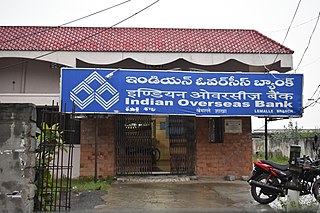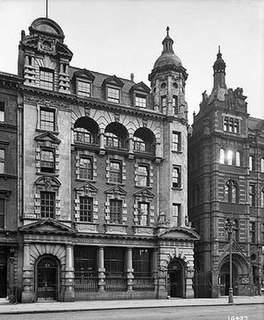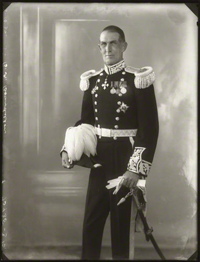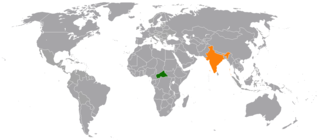Related Research Articles

State Bank of India (SBI) is an Indian multinational public sector bank and financial services statutory body headquartered in Mumbai, Maharashtra. SBI is the 43rd largest bank in the world and ranked 221st in the Fortune Global 500 list of the world's biggest corporations of 2020, being the only Indian bank on the list. It is a public sector bank and the largest bank in India with a 23% market share by assets and a 25% share of the total loan and deposits market. It is also the fifth largest employer in India with nearly 250,000 employees.

Bank of Baroda (BOB) is an Indian nationalised banking and financial services company. It is under the ownership of Ministry of Finance, Government of India. It is the fourth largest nationalised bank in India, with 132 million customers, a total business of US$218 billion, and a global presence of 100 overseas offices. Based on 2019 data, it is ranked 1145 on Forbes Global 2000 list.

Indian Bank is an Indian nationalised financial services and banking company. It is under the ownership of the Ministry of Finance of the Government of India, established in 1907 and headquartered in Chennai, India. It serves over 100 million customers with 41,620 employees, 6,004 branches with 5,428 ATMs and Cash deposit machines and is one of the top performing public sector banks in India. Total business of the bank has touched ₹930,000 crore (US$120 billion) as on 31 March 2021. Bank's Information Systems and Security processes certified with ISO27001:2013 standard and is among very few Banks certified worldwide. It has overseas branches in Colombo and Singapore including a Foreign Currency Banking Unit at Colombo and Jaffna. It has 227 Overseas Correspondent banks in 75 countries. Since 1978, the Government of India has owned the bank. As per the announcement made by the Indian Finance Minister Nirmala Sitharaman on 30 August 2019, Allahabad Bank merged from 1 April 2020, making it the seventh largest bank in the country.

Indian Overseas Bank (IOB) is a major Indian nationalised bank. It is under the ownership of Ministry of Finance, Government of India based in Tamilnadu, India, with about 3,400 domestic branches, about 6 foreign branches and representative office. Founded in February 1937 by M. Ct. M. Chidambaram Chettyar with twin objectives of specialising in foreign exchange business and overseas banking, it has created various milestones in Indian Banking Sector. During the nationalisation, IOB was one of the 14 major banks taken over by the government of India. It is one of the two banks recommended for privatization by NITI ayog as per various news reports. As on 31 March 2021, IOB's total business stands at ₹379,885 crore (US$50 billion).
UCO Bank, formerly United Commercial Bank, established in 1943 in Kolkata, is a major nationalised bank. It is under the ownership of Ministry of Finance, Government of India. During FY 2020–21, its total business was ₹ 3.24 lakh crore. Based on 2020 data, it is ranked 80 on the Fortune India 500 list. UCO Bank was ranked 1948 in Forbes Global 2000 list of year 2018. It is one of the 12 public sector Bank of india. As of 30 March 2017 the bank had 4,000 plus service units 49 zonal offices spread all over India. It also has two overseas branches in Singapore and Hong Kong. UCO Bank's headquarters is on BTM Sarani, Kolkata.
Union Bank of India, d/b/a UBI, is an Indian government-owned bank under the ownership of Ministry of Finance with 120+ million customers and a total business of US$106 billion. After the amalgamation with Corporation Bank and Andhra Bank, which came into effect on 1 April 2020, the amalgamated entity became the fifth largest PSU bank in terms of branch network with around 9500 branches. Four of these are located overseas in Hong Kong, Dubai, Antwerp, and Sydney. UBI also has representative offices at Shanghai, Beijing and Abu Dhabi. UBI operates in the United Kingdom through its wholly owned subsidiary, Union Bank of India (UK).
The Mercantile Bank of India, London and China, later Mercantile Bank Ltd, was an Anglo-Indian bank with business focus in the Far East. It was founded in Bombay in 1853 as the Mercantile Bank of Bombay; and later in 1857 was renamed to Mercantile Bank of India, London, and China with London as its headquarters.

George Venable Allen was a United States diplomat. He served as ambassador to Iran during the crisis of 1946 and was involved in managing US relations amid the Cold War with the Soviet Union. He was involved in expanding activities of the Voice of America, exporting culture and increasing US participation in the UNESCO.

Federal Bank Limited is a major Indian Private sector bank headquartered in Aluva, Kochi. The bank has more than 1,250 branches spread across different states in India. It also has its Representative Offices abroad at Abu Dhabi, Qatar, Kuwait, Oman and Dubai.

General Jayanto Nath Chaudhuri, was a General Officer in the Indian Army. He served as the 6th Chief of Army Staff from 1962 to 1966 and the Military Governor of Hyderabad State from 1948 to 1949. After his retirement from the Indian Army, he served as the Indian High Commissioner to Canada from 19 July 1966 until August 1969.

The Ministry of External Affairs of India is the government agency responsible for maintaining the foreign relations of India. The Ministry of External Affairs is headed by the Minister of External Affairs, a Cabinet Minister. The Foreign Secretary, an Indian Foreign Service officer, is the most senior civil servant who is the head of the Department of Foreign Affairs. The Ministry represents the Government of India through embassies and is also responsible for India's representation at the United Nations and other international organizations. It also advises other Ministries and State Governments on foreign governments and institutions.

The historic overseas bank was established in London in 1828 as Leslie & Grindlay, agents and bankers to the British army and business community in India. Banking operations expanded to include the Indian subcontinent, the Middle East and elements of Africa and Southeast Asia. It was styled Grindlay, Christian & Matthews in 1839, Grindlay & Co from 1843, Grindlay & Co Ltd from 1924 and Grindlays Bank Ltd in 1947 until its merger with the National Bank of India.
Palai Central Bank was a commercial bank headquartered in Kerala, South India that functioned during the middle of last century. Although it was started in a small remote city, the bank grew up to become not only the biggest bank but the biggest institution in Kerala, after the state government, and the 17th largest among the 94 scheduled banks in India. The Kerala High Court in 1960 ordered the liquidation of Palai Central Bank on a petition from the Reserve Bank of India.
The decolonization of Asia was the gradual growth of independence movements in Asia, leading ultimately to the retreat of foreign powers and the creation of a number of nation-states in the region. A number of events were catalysts for this shift, most importantly the Second World War. Prior to World War II, some countries had already proclaimed independence.

Overseas Indians, officially known as Non-Resident Indians (NRIs) or Persons of Indian Origin (PIOs), are people of Indian birth or ancestry who live outside the Republic of India. According to a Ministry of External Affairs report, there are 32 million NRIs and PIOs residing outside India and overseas Indians comprise world's largest overseas diaspora. Every year 2.5 million Indians migrate overseas, which is the highest annual number of migrants in the world.

Sir Bernard Henry Bourdillon (1883–1948) was a British colonial administrator who was Governor of Uganda (1932–1935) and of Nigeria (1935–1943).

India–Kenya relations are bilateral diplomatic relations between the Republic of India and the Republic of Kenya.
Panchapakesa Jayaraman is an Indian writer, scholar, vedic priest and a former executive director of the Bharatiya Vidya Bhavan, USA. He is a known academic in Vedic Studies and Indian philosophy. He has edited six and authored 12 books including, Subrahmaṇya Bhāratī: Bhārata sapūta, published in 1967 by Kshitija Prakāśana.

Central African Republic–India relations refers to the international relations that exist between the Central African Republic (CAR) and India. The Embassy of India in Kinshasa, Democratic Republic of the Congo is concurrently accredited to CAR. India also maintains an Honorary Consulate General in Bangui. CAR has no diplomatic mission in India.
The Wallace brothers were the six sons of Edinburgh architect Lewis Wallace. In varying combinations, the brothers established themselves as one of the leading nineteenth century East India merchants, trading in cotton, tea, coffee and other commodities. Through their investments in Burma, they became the world's leading exporter of teak. The rise of independent governments after World War II meant the progressive loss of the family's Eastern assets and the redeployment of capital back to London. This capital was used in the 1960s to establish Wallace Brothers as a banking house but this strategy did not long survive the secondary banking crisis of 1973-75.
References
- American Indian Fund (1948) Indian affairs. (New York, Association on American Indian Affairs).
- Gaur, Krishna Deo (2011). Textbook on the Indian Penal Code. Universal Law Publishing. ISBN 978-8175347038.